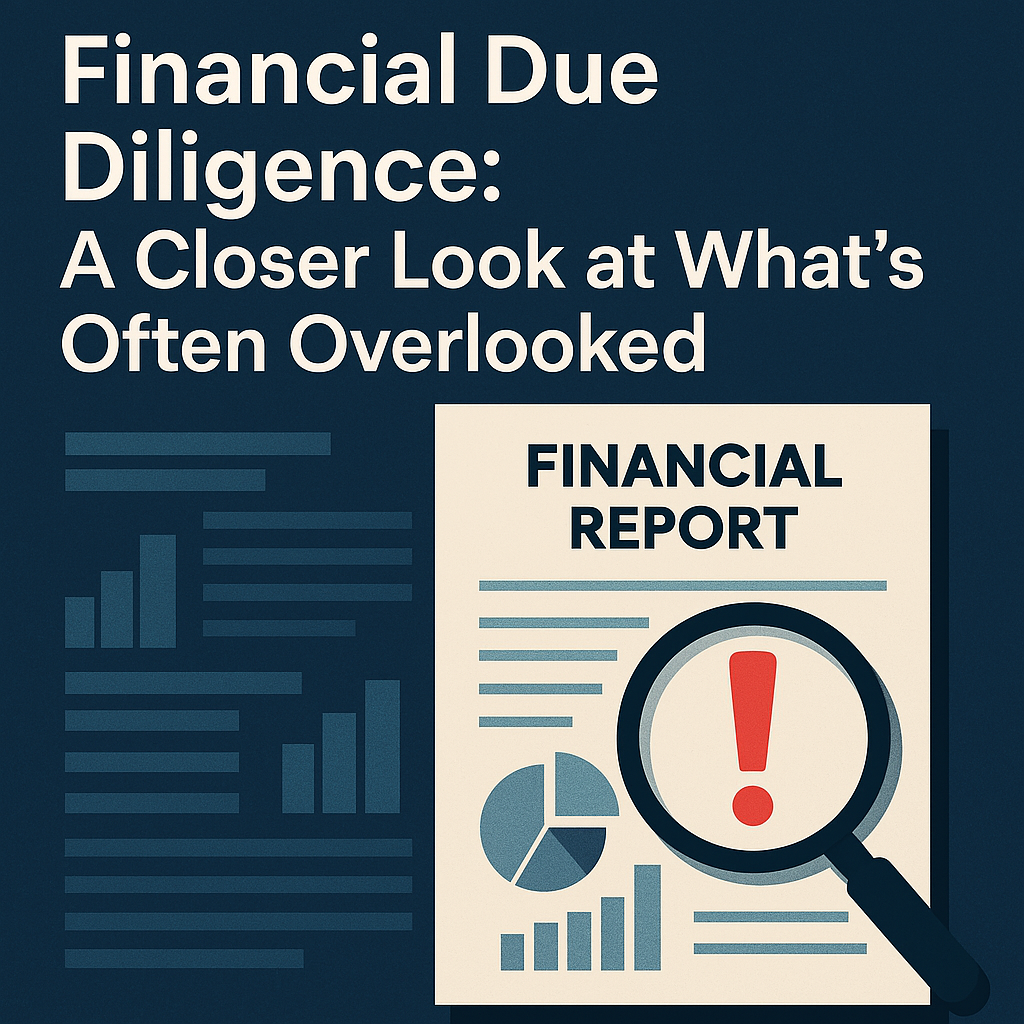When it comes to deals (mergers, acquisitions, or investments) financial due diligence is a term that gets thrown around a lot.
What is due diligence? It’s often seen as the final checklist, a necessary step to avoid disaster. But (much like the rest of business) it isn’t just about going through the motions.
It’s about ensuring that all the unseen aspects of a company are examined with the same level of care as the obvious ones.
The biggest mistakes often happen when companies overlook or rush through this crucial phase.

1. Beyond the paperwork
For most, financial due diligence report is understood as a process of verifying facts, figures, and documentation. It’s the formal inspection that typically focuses on financial records, legal compliance, and operational assessments.
However, there’s much more to it than just ticking boxes.
Many companies get stuck focusing ENTIRELY on financials during due diligence. This isn’t inherently bad… but it can be limiting. A company might look financially sound, but if its culture is toxic, or its operational systems are outdated, it can still fail post-acquisition.
There’s also the intellectual property, brand value, and customer loyalty often fall through the cracks. These are harder to quantify, but they’re often the difference between success and failure.
TIP:
The intangible aspects (company culture, leadership quality, and market reputation) are just as critical to assess. Companies that fail to investigate these elements often face avoidable challenges later on.
Because.. A due diligence report shouldn’t just be about what’s on paper.
2. Risk management
One of the core purposes of financial due diligence is to identify risks. But what does risk look like, really?
Sure, obvious red flags (like pending lawsuits or regulatory violations) show up on the radar, but many risks are much subtler.
For example:
- A company might not have legal trouble, but its reputation could be on the line. Negative press, unhappy employees, or unresolved customer complaints can significantly impact long-term growth.
- The departure of a top leader, or internal disagreements about strategy, can lead to upheaval that’s not immediately apparent.
- Cultural misalignment which often comes up in mergers and acquisitions. If two companies have vastly different cultures, it could cause friction post-deal, even if the financials align perfectly.
TIP:
Don’t just assess risks that are easily measurable. Take time to consider cultural and reputational factors that might not be directly reflected in financial statements.
3. Focusing too much on financial due diligence
While the idea behind due diligence is to protect a deal, the process itself can sometimes become a bottleneck.
It’s not uncommon for companies to spend so much time on due diligence that they miss opportunities elsewhere or lose sight of the bigger picture.
For example, on November 2023, AstraZeneca’s CEO, Pascal Soriot, engaged in discussions with the UK government to expand the company’s vaccine plant in Speke, with an anticipated government grant of £100 million.
But, prolonged negotiations and reassessments by the government led to a reduced grant offer, which AstraZeneca deemed insufficient.
And then, frustrated by the delays and reduced support, AstraZeneca was forced to cancel the expansion project entirely.
Beware of these hidden costs:
- Overcomplicating the process and trying to go too deep can paralyze a deal. Overdue diligence, where every minute detail is scrutinized, can slow things down unnecessarily.
- Resource drain as due diligence takes time (time which has grown from 124 days to 203 days in a decade) and it often requires the involvement of numerous departments. While this is necessary, it can pull focus away from running the business or making decisions about the future.
- Analysis paralysis as sometimes, companies get so bogged down by the minutiae of the process that they miss the forest for the trees. They might delay decisions because they’re waiting for the “perfect” data, but this can lead to missed opportunities.
TIP:
Have a clear and focused due diligence strategy. Focus on the high-impact areas that will truly make or break the deal. Efficient due diligence isn’t about doing everything..it’s about doing the right things.
4. Too internally focused
Financial due diligence isn’t and shouldn’t be just a task for one department.
It requires cross-functional collaboration to make sure nothing falls through the cracks. A strong team (especially with diverse perspectives) is very important.
But too often, companies overlook this element.
When due diligence is only handled by a few departments, valuable insights can be missed. Take for example, when the legal might be too focused on compliance, while finance is looking at projections, but without cross-collaboration, the bigger picture could be missed.
External consultants or advisors can provide some very needed objectivity. They can offer insights that in-house teams might not have.
Basically:
You have to treat due diligence as a collaborative effort. Encourage input from all relevant departments, and don’t hesitate to bring in external perspectives. This can help catch things that may have been missed and ensure a thorough analysis.
5. Customer base
Another aspect that’s often overlooked in due diligence is the customer base.
Sure, the number of customers, their loyalty, and spending habits are important, but it might be extremely concentrated.
Meaning it relies heavily on a small group of clients for its revenue. If something happens to those key clients, it could lead to a sudden drop in income.
So, it’s important to understand if a company is diversified or dependent on a handful of clients.
Market dynamics also play a huge role in this. It’s easy to get caught up in the idea that a company is doing well because it’s currently profitable.
However, the market they operate in could be changing.
New competitors, shifts in consumer behavior, or changes in regulations could all have an impact on the future viability of the business.
Assessing the market conditions and understanding the long-term outlook can help you avoid investing in a business that might be on the verge of losing its competitive edge.
Due diligence isn’t just a formality
It’s a powerful tool to ensure that deals (any kind of deals) are built on solid foundations. However, it’s all too easy to make the mistake of treating it as a box to check or an exercise in avoiding risks.
The areas often overlooked can have significant long-term impacts that aren’t immediately visible.
However, if you do it right (not too long, not too quick – just perfect) you won’t just identify red flags; but you will also use that information to make better, more informed decisions.
